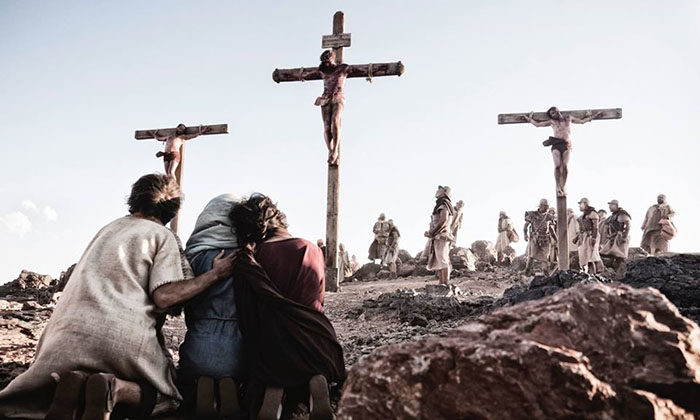
(The Gospel Coalition) – Why did Jesus die?
Historically, from a human perspective, the answer is straightforward enough. The Jewish leaders plotted against him, Judas betrayed him, Herod and Pilate tried him, and the Roman soldiers executed him.
A number of individuals and groups were responsible for his death. As Luke puts it, “Wicked men put him to death by nailing him to the cross” (Acts 2:23).
But there’s another angle to consider. As Acts 2:23 also says, Jesus was “handed over by God’s deliberate plan and foreknowledge.” To get to the heart of the question of why Jesus died, we have to think from God’s point of view. Theologically, from God’s perspective, we may mention two main reasons.
1. Jesus Died to Bring Us Near to God
Christ died for sins once for all, the righteous for the unrighteous, to bring you to God. (1 Pet. 3:18)
The purpose of bringing us to God implies that, prior to Jesus dying, we were far away. On this score, the apostles Paul and Peter agree: “You who once were far away have been brought near through the blood of Christ” (Eph. 2:13).
Our sin needed to be dealt with to bring us near: “Christ died for sins” (1 Pet. 3:18). The Bible does not mince words when it comes to human disobedience and its consequences. Jesus can describe his disciples as evil (Matt. 7:11), and Paul says in Romans 6:23 that “the wages of sin is death.” All humans stand condemned before God; our sins separate us from him whose character is pristine holiness and perfect justice.
The substitutionary nature of Jesus’s death is the key idea for understanding how God deals with sin and offers us forgiveness. To bring us near, “Christ died for sins, the righteous for the unrighteous” (1 Pet. 3:18). If “the unrighteous” is all of us, “the righteous” is Jesus himself. The one who “knew no sin, became sin” (2 Cor. 5:21)—our sin—so that we might receive mercy.
The New Testament uses several vivid images to expound the truth that Jesus died in our place. For example, Jesus paid the price for our redemption when he “gave his life as a ransom in the place of many” (Mark 10:45). Jesus reconciled us to God by bearing our sins himself (1 Pet. 2:24). “God presented Christ as a sacrifice of atonement through the shedding of his blood” (Rom. 3:25), exhausting God’s wrath against our unrighteousness.
Paul reminds us that Jesus’s death in our place is of first importance and was in accordance with the [Old Testament] Scriptures (1 Cor. 15:3). His death fulfills the old covenant sacrifices, such as the sin offering, the Passover lamb, and the scapegoat of the Day of Atonement. He’s the Suffering Servant who was “pierced for our transgressions” (Isa. 53:5).
Sometimes well-intentioned preachers give the false impression that in dying for us Jesus persuaded a reluctant and vengeful Father to show mercy. Truth is, it was out of love that God sent his Son, and the Son laid down his life of his own accord: “God was in Christ reconciling the world to himself” (2 Cor. 5:19).
All three persons of the Trinity, then, are fully involved in our redemption: “Christ offered himself through the eternal Spirit to God” (Heb. 9:14). As Graham Cole puts it, the Father is the architect, the Son the accomplisher, and the Spirit the applier of the atonement.
2. Jesus Died to Reveal God’s Character
It isn’t that we knew nothing of God before Christ’s death. His providential care for creation reveals his love. And his promises to Abraham show his concern for the whole world. But at the cross, we see the climax of his covenants with Israel, and we witness the final and dramatic proof of his love and justice.
Two texts from Romans make this clear: “God demonstrates his own love for us in this: While we were still sinners, Christ died for us” (Rom. 5:8). Christ’s death puts beyond all doubt the fact that God loves us. It assures us that no matter what life throws at us, we can trust that “he who did not spare his own Son, but gave him up for us all . . . will also graciously give us all things” (Rom. 8:32).
Jesus also died to prove the justice of God: “God presented Christ as a sacrifice of atonement . . . to demonstrate his justice” (Rom. 3:25–26).
God doesn’t forgive us by turning a blind eye to our sin or by overlooking it. Forgiveness is costly to the one against whom the wrong has been done. And at the cross we see not only God’s love, but also the seriousness with which he takes our sin.
Elsewhere in the New Testament, we also learn that Jesus died to demonstrate the wisdom, power, and glory of God.
Boasting in the Cross
There are many other reasons Jesus died. These include to conquer evil, to inaugurate the new covenant, and to set us an example of sacrificial love. But two vital reasons are to bring us to God and to reveal God’s character.
Where would we be if God had not sent his Son to die for us? Without the cross, we’d be “darkened in our understanding of God and alienated from the life of God” (Eph. 4:18).
You may know the slogan, “A pet is for life, not just for Christmas.” I’m tempted to coin another: “The death of Jesus is for life, not just for Easter.” For the cross, Leon Morris notes, “dominates the New Testament.”
After many years as a Christian and almost 30 years of teaching theology, I’ve become more and more convinced that the death of Jesus changes everything. I pray each of us will join Paul in saying, “I will never boast about anything except the cross of our Lord Jesus Christ” (Gal. 6:14).
Article First Published by The Gospel Coalition.

